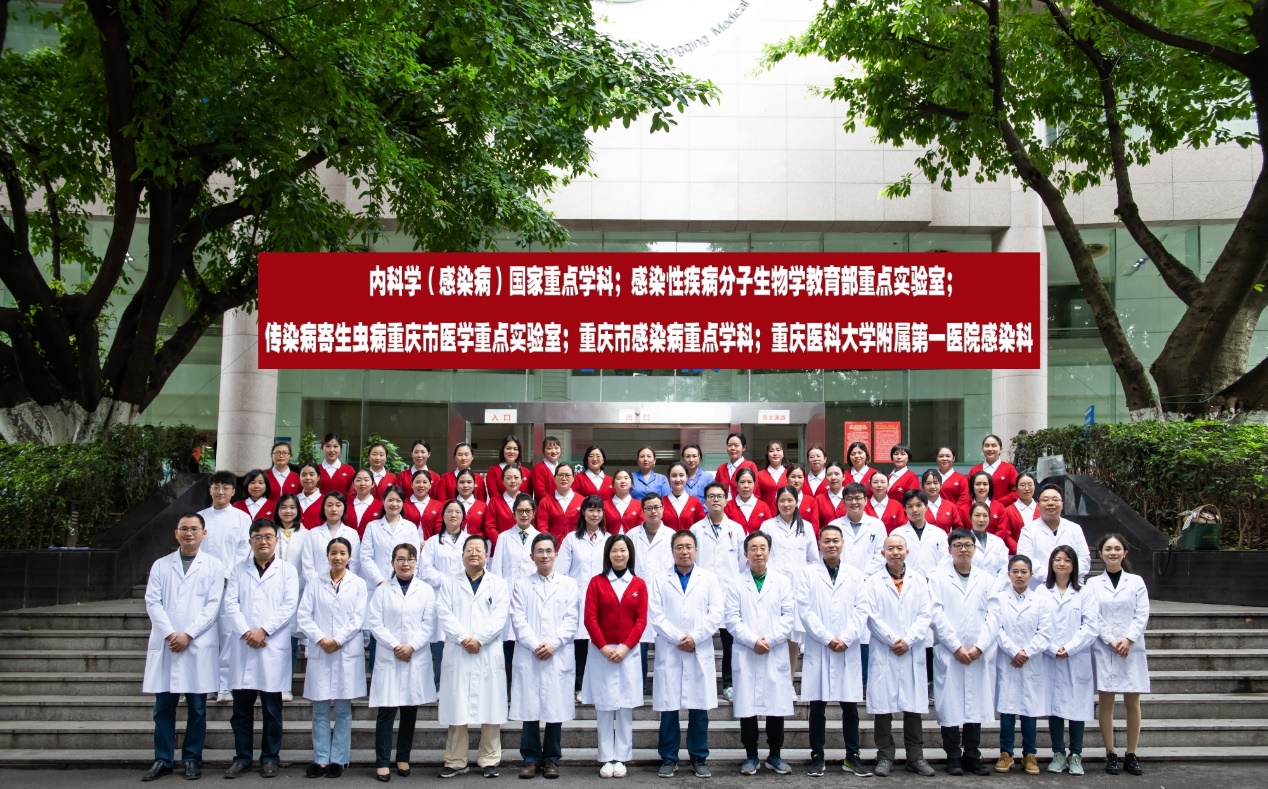The Department of Infectious Diseases at the First Affiliated Hospital of Chongqing Medical University (formerly the Department of Communicable Diseases) was established in 1957 by renowned infectious disease experts QIAN De, LIU Yuehan, WANG Qinan, ZHANG Dingfeng, and DU Jizhao, who relocated from Huashan Hospital of Shanghai Medical University to Chongqing. Over the past six decades, through the efforts of successive generations of distinguished professionals such as CHEN Yatang, XIAO Yonghong, HUANG Wenxiang and LI Yongguo, the department has evolved into a nationally renowned discipline with significant academic influence and prestige. It serves as a major hub for the clinical practice, education, research, and professional training in the field of infectious diseases in China. The department has held, and continues to hold, key leadership roles, including as vice-chairs and standing committee member of the Infectious Diseases Branch Physicians of the Chinese Medical Association and the Infectious Disease Physicians Branch of the Chinese Medical Doctor Association. It is one of the pioneering institutions recognized as a national key discipline in infectious diseases, among the first to award master's and doctoral degrees in the field, and a leading center for clinical pharmacological research in anti-infective and antiparasitic drugs. Furthermore, it was the first institute for research on infectious and parasitic diseases in Western China. The department is also designated as a key clinical specialty for infectious diseases in Chongqing and a National Fatty Liver Disease Diagnosis and Treatment Center by the Chinese Medical Doctor Association. From 2009 to 2022, the department has consistently been featured in the Fudan Ranking for Infectious Diseases, advancing by three positions in 2022 compared to the previous year.
The department operates 72 inpatient beds, divided into three specialized units: Infectious Diseases Ward 1, Infectious Diseases Ward 2, and the Hepatology Unit. The department handles more than 70,000 outpatient consultations annually and admits over 1,500 patients for hospitalization. The department specializes in the diagnosis and treatment of complex infectious diseases, critical care infections, antiviral therapies, viral hepatitis, fatty liver disease, various liver diseases, and parasitic infections, positioning itself at the forefront of these specialties in China. All physicians in the outpatient department hold associate professor or higher academic titles, ensuring expert-level clinical care. The department is equipped with dedicated ultrasonography rooms and advanced diagnostic facilities for liver stiffness and fat content assessment, including the latest color Doppler ultrasound scanners, the French E-TEST liver fibrosis detector, and FibroScan technology with Controlled Attenuation Parameter (CAP) for quantitative assessment of liver stiffness and steatosis. These non-invasive imaging modalities allow for precise evaluation of liver steatosis, inflammation, and fibrosis in liver disease patients. Additionally, the department offers high-precision nucleic acid testing for hepatitis B and C viruses, liver biopsy, multi-drug-resistant bacterial identification, drug susceptibility testing, and parasitic identification, among other specialized services.
The Institute of Infectious and Parasitic Diseases, affiliated with the department, has been monitoring bacterial resistance since the 1980s, enhancing bacterial detection and resistance research to regionally guide the rational use of anti-infective drugs. The laboratory boasts a comprehensive suite of specialized instruments, including standard and ultra-low temperature freezers, general incubators, and CO₂ incubators, standard and low-temperature centrifuges, biosafety cabinets, laminar flow workbenches, ice makers, ATB identification systems, drying ovens, and multifunctional microplate readers to support both clinical and research needs. In 2007, the department pioneered the establishment of Chongqing’s first P2 Biosafety Laboratory, outfitted with cutting-edge diagnostic technologies, including advanced nucleic acid sequencers sequencing, fluorescent quantitative PCR, 16S ribosomal RNA (16S rRNA) sequencing, time-of-flight mass spectrometry (MALDI-TOF MS), and molecular diagnostics. This facility constitutes an advanced molecular pathogen diagnostics platform, capable of detecting influenza A/B and other pathogens. Since 2001, the department has pioneered the application of artificial liver support systems.
The department has established six specialized subunits, each focusing on distinct aspects of infectious diseases: Emergency Early Warning and Management of Infectious Disease Outbreaks, Diagnosis and Treatment of Fever of Unknown Origin, Severe Infectious Diseases and Critical Care Infections (Infectious Disease ICU), Viral Hepatitis and Liver Failure, and Parasitic Diseases.
Key Specialties and Diseases Treated:
Acute and chronic viral hepatitis (Hepatitis B, C, A, etc.)
Liver failure, cirrhosis, and drug-induced liver injury
Metabolic-associated Fatty Liver Disease (MAFLD) and alcoholic liver disease
Acute fatty liver of pregnancy and pregnancy-related liver disorders
Severe pneumonia and respiratory failure of unknown cause
Diagnosis and management of fever of unknown origin
Comprehensive management of Sepsis-induced septic shock and multiple organ failure
Central nervous system infections (tuberculous meningitis, cryptococcal meningitis, pyogenic meningitis)
Treatment of refractory multidrug-resistant bacterial infections (Community and Hospital-Acquired)
Diagnosis and treatment of deep fungal infections
Infective endocarditis
Infectious diarrhea
Complex soft tissue infections (e.g., gas gangrene)
Various parasitic diseases
The department consists of 25 physicians, including 10 professors/chief physicians and 4 associate professors/associate chief physicians. Among its members are Chongqing Academic and Technical Leaders, reserve candidates for such positions, Chongqing’s High-End Young and Mid-Aged Medical Talents, national March 8th Red-Banner Holders, recipients of the Wuhan May 1st Labor Medal, and distinguished experts under the “Chongqing Talent” program. Over two-thirds of the department’s physicians have undergone international training or fellowships, which has significantly contributed to its strong academic reputation both nationally and regionally. The department also serves as the Vice Chair Unit of the Infectious Disease Physicians Branch of the Chinese Medical Doctor Association, the President Unit of the Infectious Disease Physicians Branch of the Chongqing Medical Doctor Association, the Chair Unit of the Hospital Infection and Control Committee of the Chongqing Preventive Medicine Association, the Leadership Unit of the Chongqing Antimicrobial Resistance Diagnosis and Treatment Alliance, the Chair Unit of the Chongqing Hepatology and Infectious Diseases Specialty Alliance, and a Member of the Infectious Disease Branch of Chinese Medical Association.





